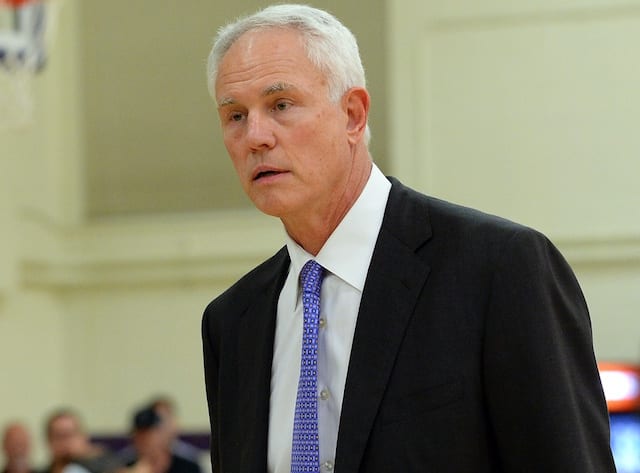There are two kinds of Lakers fans out there: those who think that it was a good idea to extend the contract of general manager Mitch Kupchak and those who we should be embarrassed by. The fact that there is anyone out there even the least bit critical or angry with the decision is hilarious. In simplest terms, Kupchak is the last remaining link (not named Buss) to the franchise’s glory days. Jerry Buss and Bill Sharman have passed away, Jerry West is with the Warriors, Magic Johnson is with the Dodgers, Pat Riley is with the Heat, Phil Jackson is with the Knicks, and so on and so on.
The Lakers signed Kupchak as a player in 1981 and he’s been with them ever since. First as a player, then as assistant GM, then as GM, and then to his current position as VP of basketball operations. During that time, he’s accumulated nine championship rings and been a part of six other teams that made it to the NBA Finals. That’s 15 Finals appearances in 33 years. The fact that the Lakers haven’t had cap space every minute he’s been on the job since taking over for West, tells you what an amazing job he’s done.
Kupchak has made his share of mistakes, just like every other GM before or after him has. If there’s one major criticism of Kupchak that I have, it’s in some of the free-agent contracts he gave out, both to the Laker’s own free agents, as well as to those from other teams. But for every 6-year, $30 million contract given to Luke Walton or 3-year, $10.5 million deal he gave to Brian Cook, there’s a 4-year, $33 million contract he gave to Lamar Odom (with a team option for the fourth year) or a 2-year, $3.7 million contract for Matt Barnes. For every (2004 model) Vlade Divac or Chris Kaman he should have passed on, there’s a Trevor Ariza, Jordan Hill, and Shannon Brown he acquired via trade for Brian Cook, Mo Evans, Derek Fisher, and Vladimir Radmanovic.
While it’s fair to place the blame on Kupchak for giving out those contracts in the first place, he can’t be blamed for the franchise’s determination to disregard the draft as a pipeline for bringing in young talent. That’s because the decision to trim a luxury tax bill doesn’t come from Kupchak — it’s an edict from ownership. Because the Lakers seem to always be above the luxury tax limit, the value of each of their player contracts has to be analyzed not just through the lens of how much the player was getting paid, but by how much it was costing the team when the luxury tax penalties were factored in. Paying $5 million to Sasha Vujacic in the final year of his contract wasn’t that bad. It was Vujacic costing them $10 million with the luxury tax added in that was.
In order to convince teams to take those bad contracts, Kupchak had to entice them with first-round picks. That’s exactly how they were able to dump the contracts of Walton, Vujacic, and Fisher. It wasn’t Kupchak’s decision to trade away those picks. Just as it wasn’t his decision to sell their 2009 pick to the Knicks for nothing but a future second-round pick and cash. If that’s not enough to absolve Kupchak, we also need not pretend that Lakers fan should be crying about never having had any of the players selected with those picks.
Below is the list of who was selected with every Lakers first-round pick since they last kept it for themselves in 2007.
The 2008 and 2010 picks were traded for Pau Gasol, the 2009 pick was sold to the Knicks, the 2011 pick was traded to the Nets along with Vujacic for a future second-round pick, the 2012 and 2013 picks went with Walton to Cleveland for Ramon Sessions and the Heat’s 2012 first-rounder:
2008 and 2010
Transaction: traded to Memphis for Pau Gasol and a 2010 second-round pick (that became Devin Ebanks)
Players selected: 2008 – Donte Greene (now a free agent), 2010 – Greivis Vasquez (fourth team in four years)
2009
Transaction: sold to the Knicks for cash and 2011 second-round pick (Andrew Goudelock)
Player selected: Toney Douglas (currently on his fifth team in five seasons)
2011
Transaction: traded to the Nets with Vujacic for Joe Smith and second-round picks in 2011 (Darius Morris) and 2012 (Robert Sacre)
Player selected – JaJuan Johnson (currently in Italy after one NBA season)
2012 and 2013
Transaction: traded to the Cavs with Walton for Sessions and Miami’s 2013 first-round pick (*Nemanja Nedovic)
Players selected: 2012 – Jared Cunningham (on his third team in two seasons), 2013 – Sergey Karasev (currently on the Cavs D-League team after averaging 1.8 ppg with Cleveland)
*-Nedovic, taken with the last pick of the first-round in 2013, was traded to Phoenix in the Steve Nash trade. Phoenix traded him to the Warriors on the day of the draft. He’s currently racking up DNPs on their D-League team after averaging 1.1 ppg with Golden St.)
2014, 2015, 2016, 2017, or 2018
Kupchak also acquired a top-20 protected pick from Dallas in the Lamar Odom trade. That pick doesn’t lose its top-20 protection until 2018. Kupchak traded the pick to the Rockets, along with Derek Fisher, for Jordan Hill. Houston later traded it to Oklahoma City as part of the package for James Harden. The Thunder will receive the pick if the Mavs finish with a top-10 record in the league any year between now and 2017. At the time of writing, the Mavs have the 9th-best record in the league, giving them the 22nd pick if the season were to end today.
I’m not going to pretend that Kupchak would have drafted any of those aforementioned guys nor deny that plenty of current NBA players were selected after them. But that’s not really the point. The point is that five of those eight picks ended up either 27th, 28th, 29th, or 30th in the draft, two others were 19th and 24th, and the last one has to land between 21-30 for OKC to get the chance to use it before 2018.
When you’re the Lakers, it isn’t crazy to just assume your first-round pick will land in the 20s every year and treat those picks as no more valuable than second-round picks. A strong argument could be made that each of those picks was more valuable as a luxury tax coupon or an unknown commodity than the player that was eventually drafted with it. You could also make the case that nearly every one of Kupchak’s second-round picks, either already has or will end up having, a more productive career than any of the players taken with those picks he traded away between the 2008 and 2014 NBA Drafts.
As shrewd as Kupchak has been, he’s made his fair share of mistakes and I don’t consider the Nash or Howard trades among them. If there is one thing that I’m worried about, it’s how the new CBA has changed the rules by taking the full mid-level exception from teams more than $4 million over the luxury tax. That may have been the single greatest advantage that large market teams had over the smaller ones. The ability of teams like the Lakers and Knicks to spend $5 million on one (or two) free agents every year, no matter how far they were over the cap, gave Kupchak a chance to make up for a previous mistake without really hurting the team too bad financially. Since the new CBA went into effect, the Laker’s exorbitant payroll has only allowed Kupchak to hand out one $3 million contract each summer. The margin of error has shrunk considerably. There are no more do-overs.
If Kupchak can keep the Lakers over the cap but below the $4 million apron, he will have one or two seasons to use the full mid-level exception before the Lakers will likely cross that limit. Since the Lakers can’t trade a first-round pick earlier than 2019 and they don’t have any young players on rookie contracts that other teams covet, those exceptions will likely be their only chance to fill in the missing pieces after they’ve hopefully used all their available cap space on top-tier free agents. How teams utilize their exceptions could be the difference between winning a championship or not. The Heat used exceptions to sign Shane Battier and Ray Allen. The Clippers have used theirs to sign Jamal Crawford and Matt Barnes.
What has given me the most confidence as far as Kupchak’s ability to build the roster going forward, it’s in the things we’ve heard from him during this current rough patch. There was one particular answer that Kupchak gave Sam Amick of USA Today this week that I found particularly memorable:
Now the collective bargaining agreement changed considerably (after the 2011 lockout) the playing field. That’s just the way the owners wanted it, and as a manager, all we’ve ever said is just give us the rules and we’ll play with the rules.”
There are a few different reasons as to why I found it particularly memorable. For one, it tells me that the franchise isn’t into dwelling on why it’s in its current state. The Lakers have never complained about the failed Chris Paul trade, at least not publicly. Nor have they complained about how the owners changed the rules by taking some of the old tools away and giving them nothing but an amnesty provision with which to help their roster adapt.
I might be wrong, but when Kupchak says it’s “just the way the owners wanted it,” it sounds to me like the organization feels as if the new CBA was intended specifically to punish them and they won’t give them the satisfaction of seeing them this way for long. Can you blame him? Even though the moves they’ve made under the new CBA haven’t worked out the way they’d hoped, they haven’t stopped them from trying to be great again, despite limited trade assets and being well over the luxury tax threshold.
The fact that they nearly pulled off the Chris Paul trade, got Dwight Howard for nothing but Andrew Bynum and a 2017 first-round pick, and then got Steve Nash for nothing but a trade exception, a future first-rounder and the pick that became Nemanja Nedovic, had to piss the other owners off. It must have felt like one of those movies where the bad guy puts the protagonist in handcuffs, locks him in a trunk, throws the trunk in shark-infested water, and somehow the hero shows up in the final scene to save the girl and kill the bad guy before he harms her.
Not only do the Lakers seem motivated by a collective will to win but Kupchak’s comments give me the impression that they are also motivated by certain spite for some of the other owners. I can’t help but wonder if the Laker’s decision to amnesty Metta World Peace wasn’t so much about saving money than it was about keeping that money out of the pockets of the cheap owners who tried to punish them. As if to say, “Be careful what you wish for, you just might get it.”
We’ve seen Kupchak oversee four championships and two other Finals appearances with barely any assets. I’m anxious to see what he can do now that he’s actually got a few tools to work with. I’m not saying that the Lakers will contend again anytime soon or even get back to the playoffs next year. I’m only saying they have the right person in charge and it gives me peace of mind knowing that the Buss kids feel the same way.






